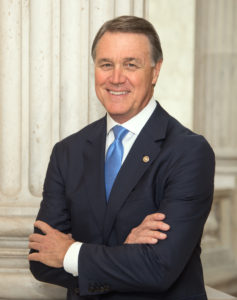
We are starting to see positive results and a change in direction under President Trump’s leadership. However, we are still in a moment of crisis. The world is more dangerous than at any point in my lifetime, and we face symmetric and asymmetric threats from all corners of the globe. The single greatest threat to our national security is homegrown, and it is our national debt.
Last October, our national debt surpassed $20 trillion. Last month, it surpassed $21 trillion. It is on track to grow by another $10 trillion over the next decade. Recent interest rate hikes mean we are on track to soon be paying $500 billion annually in interest on the debt alone. That is more than the federal government spends on NASA, NIH, the Army Corps, and the Veterans Administration combined. On top of that, there is another $100 trillion in future unfunded liabilities coming at us like a freight train.
The national debt threatens our ability to deal with global security threats, whether it is ISIS and other terror cells in the Middle East, rising aggression from Russia and China, the nuclear ambitions of rogue regimes in North Korea and Iran, or an emerging arms race in space.
We are on track to soon be paying $500 billion annually in interest on the debt alone. that is more than the federal government spends on nASA, NIH, the Army corps, and the VA combined.
Military leaders agree. For example, Admiral Mike Mullen is a former Chairman of the Joint Chiefs of Staff. For years, he has called the debt the greatest threat to our national security. Defense Secretary James Mattis said the same thing in his confirmation hearing last year. He said, “I consider it abrogation of our generation’s responsibility to transfer a debt of this size to our children.” Secretary Mattis is exactly right.
President Trump has taken several critical steps to deal with global security threats. He is rebuilding our military and reengaging with the rest of the world. But if we do not deal with the debt crisis, it will undermine each of these important gains.
There is no immediate fix for the debt crisis. It is going to take long-term planning over the next several decades, but there are five immediate imperatives to get started.
First, economic growth has to continue. Last year’s historic tax cuts and regulatory rollback are on track to help put $4 trillion back to work in our economy. If enacted, the Senate’s Dodd-Frank rollback will put in play another $2 trillion stuck on bank balance sheets. To have a strong foreign policy, you have to have a strong defense. To have a strong defense, you have to have a strong economy.
Second, redundant spending in the federal government should be rooted out and eliminated. This should be happening across all agencies.
President Trump is rebuilding our military and reengaging with the rest of the world. But if we do not deal with the debt crisis, it will undermine each of these important gains.
Third, Washington’s broken budget process should be changed. It has only worked four times in 44 years. It creates uncertainty for our military, does not deal with every dollar the federal government spends, and does not impose harsh consequences on Congress for failure. This is another root cause of our debt crisis.
Fourth, Social Security and Medicare must be saved. They are the largest drivers of federal spending, and both of their trust funds will go to zero in less than 20 years.
Fifth, we have to get after the real drivers of rising health care costs.
Career politicians allowed our national debt to grow for years, and now we are past the tipping point of a crisis. It is the challenge of our time, and it is not going to be solved by anything less than bold action. This is critical if we are going to meet the global challenges and threats of today and tomorrow.
America has always been the best at responding to a crisis, but we are often the last to recognize that we are in a crisis. Now is that time, and Washington must summon the collective will to act accordingly, before it is simply too late.
U.S. Senator David Perdue (R-GA) is the only Fortune 500 CEO in Congress and a member of the Senate Armed Services and Budget Committees.




